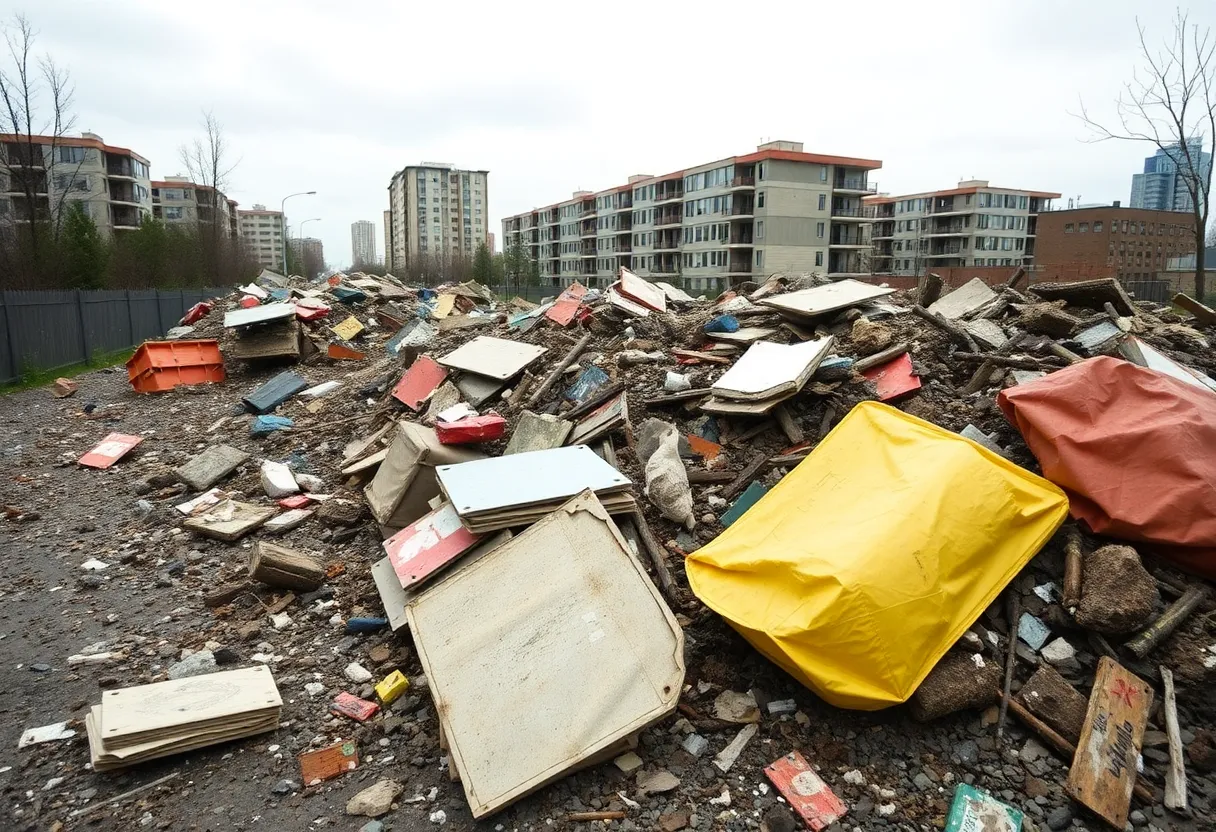News Summary
Northern Ireland is facing an escalating public health crisis, with 281 illegal dumping incidents involving asbestos reported since 2019. The presence of asbestos, linked to severe health risks such as cancer, has raised alarms about environmental safety and public welfare. Recent statistics indicate that the Antrim and Newtownabbey area has recorded the highest cases of illegal asbestos disposal. Advocacy groups are calling for a national task force to address this urgent issue, and there is a pressing demand for stringent management and safe removal of asbestos materials across the region.
Asbestos Alarm: Northern Ireland Faces Growing Crisis of Illegal Dumping
In a shocking revelation, Northern Ireland has recorded a staggering 281 illegal dumping incidents involving asbestos since 2019. As reported, these alarming figures indicate an ongoing public health crisis that demands immediate attention. Asbestos, once a staple in building materials, has been closely linked to serious health conditions, particularly cancer, when its fibers are inhaled. Despite its historical significance in construction, asbestos is now recognized as a significant danger, especially when disturbed.
Understanding the Risks: Why Asbestos is So Dangerous
The presence of asbestos becomes hazardous primarily when it is disrupted, leading to airborne fibers that can be inhaled. This illegal practice of dumping poses a profound threat not just to the environment but also to the health and safety of the public. It is crucial to understand that disposing of asbestos is not a simple task; it requires trained professionals equipped with specialized knowledge and tools to ensure safety during removal.
The Legal Framework: A Deep Dive into Regulations
It is illegal for individuals to dispose of asbestos in general household waste. It must be handled and removed by licensed contractors, and deposited only at certified hazardous waste sites. The Northern Ireland Environment Agency (NIEA) underscores the seriousness of waste crimes, referencing these activities as a peril to both public safety and environmental integrity. The failure to properly manage asbestos could lead to legal repercussions for landowners, who are obligated to secure their properties against illegal disposal activities.
Recent Developments: The Belfast Bonfire Incident
In a recent incident in July 2023, a bonfire site in Belfast alarmingly contained asbestos material. The NIEA undertook the removal of approximately 20 kilograms of hazardous material found between Donegall Road and Westlink. This incident has since sparked a criminal investigation into how the asbestos was allowed to be placed in such a high-risk environment, where it posed a potential danger to the public during celebrations.
Shocking Statistics: The Illegal Dumping Epidemic
From 2019 to 2024, Northern Ireland has witnessed over 3,000 instances of illegal waste dumping, with asbestos ranks third among the most commonly discarded materials, subordinate only to mixed waste and general construction debris. The Antrim and Newtownabbey Council Area stands out with the highest count of illegal asbestos dumping incidents—recording 44 cases since 2019. These statistics are increasingly alarming, especially when one considers the health risks associated with asbestos exposure.
Health Consequences: Mesothelioma on the Rise
The consequences of asbestos exposure are dire. Mesothelioma, an aggressive cancer linked to asbestos, often takes decades to manifest and has a high fatality rate. Disturbingly, recent reports indicate that there were 699 asbestos-related deaths recorded in Northern Ireland between 2014 and 2023. Such alarming figures underline the necessity for stringent asbestos management and disposal protocols.
Calls to Action: The Need for a National Task Force
With Northern Ireland currently bearing the unfortunate title of having the highest incidence rate of mesothelioma globally, advocacy groups are campaigning vigorously for the establishment of a national task force dedicated to tackling asbestos issues. There is a resounding call for a 40-year deadline to remove all asbestos from public and commercial buildings, as parliamentarians emphasize the urgency of this matter.
Ongoing Challenges: The Community Impact
Concerns are escalating regarding the continuing dumping of asbestos and its implications for public safety. As seen with the bonfire incident, these hazardous materials not only endanger the health of those nearby but also create significant environmental repercussions. Furthermore, the Police Service of Northern Ireland has refrained from intervening in dismantling controversial bonfires, citing fears of disorder and upheaval.
Urgency for Strategic Management
The NIEA and Belfast City Council are faced with mounting pressure to devise effective strategies for the legal disposal of hazardous materials. The failure to manage asbestos and illegal dumping effectively is being criticized as a substantial breakdown in public safety and environmental protection mechanisms in Northern Ireland. The stakes are high, and robust measures must be implemented now to protect both the environment and public health.
Deeper Dive: News & Info About This Topic
HERE Resources
Major Hotel Chain Fined for Asbestos Safety Violations
Johnson & Johnson Faces Class Action Over Asbestos Claims
Breakthrough in Mesothelioma Treatment: VT3989’s Potential
Julie Chrisley’s Lung Condition Linked to Asbestos Exposure
Asbestos Warnings Issued as California Wildfires Rage On
Massive $42.6 Million Verdict Against Johnson & Johnson
Former Factory Worker Appeals for Colleagues After Cancer Diagnosis
Woman’s Fight Against Mesothelioma: Call for Info from Colleagues
The Rising Tide of Health Risks: The Legacy of the USS Thorn
Johnson & Johnson Faces Legal Battle Over Mesothelioma Claims



















